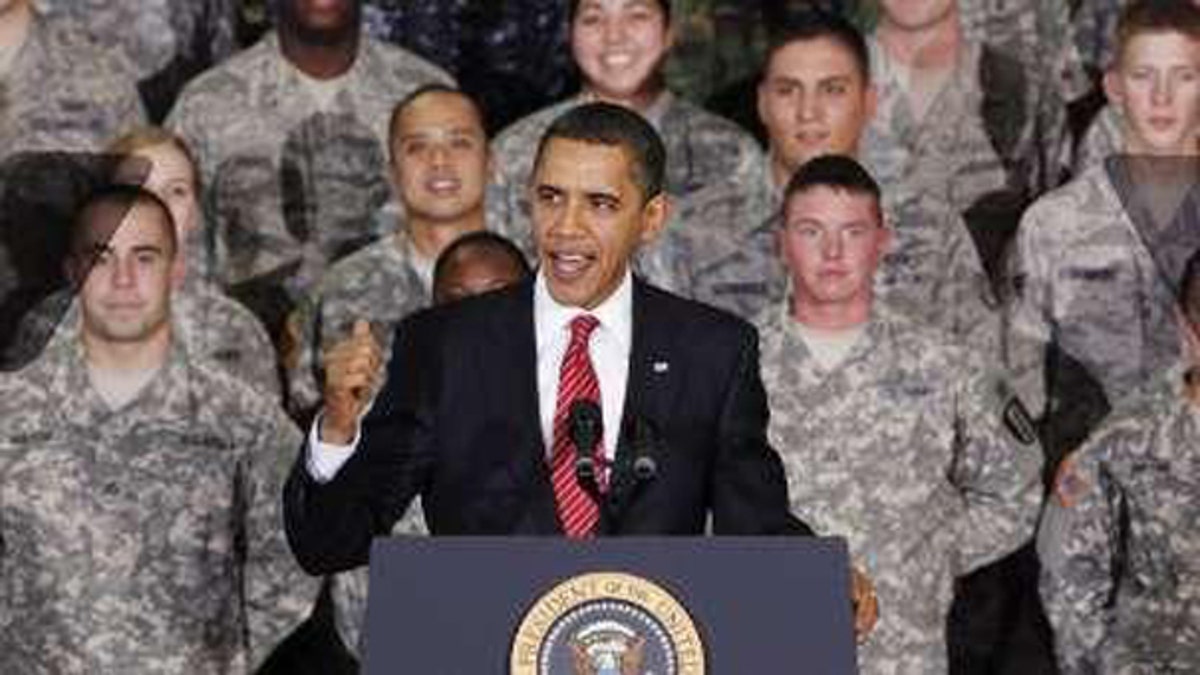
President Obama delivers a speech during a rally with troops at Osan Air Base in South Korea Nov. 19. (Reuters Photo)
The anti-war left is turning on the president it helped put into office, launching a counteroffensive against President Obama's decision to escalate the war in Afghanistan.
Activist groups are joining liberal members of Congress in condemning the president's expected announcement on Tuesday that he will order roughly 30,000 more troops to the war zone as part of an overhauled strategy to finish what President Bush started eight years ago. Some are urging him not to go through with it -- though the strategy apparently is set in stone, with Obama having issued his final orders to his generals Sunday evening.
"I simply can't believe you're about to do what they say you are going to do," documentary filmmaker Michael Moore said in an open letter to Obama posted on his Web site. Moore warned that Obama would tarnish his legacy, turn away his supporters and effectively crown himself the new "war president" by escalating the war in Afghanistan.
"With just one speech tomorrow night you will turn a multitude of young people who were the backbone of your campaign into disillusioned cynics," Moore wrote. "Your potential decision to expand the war ... will do more to set your legacy in stone than any of the great things you've said and done in your first year.
"For the sake of your presidency, hope, and the future of our nation, stop. For God's sake, stop," Moore wrote.
Such warnings speak to the deep divide the president will face Tuesday night when he announces his strategy during a speech at the U.S. Military Academy at West Point, N.Y. Many Americans have grown weary of the war effort, and some regard the Afghan government as a hopelessly corrupt partner that will undermine U.S. military efforts there. Others hold Obama's stated view that Afghanistan is the right war and must be pursued to prevent the region from becoming an international staging ground for more terrorist attacks.
Obama highlighted his opposition to the Iraq war, not the Afghanistan war, during his presidential campaign. He repeatedly criticized his top Democratic primary opponent, Hillary Clinton, for voting in favor of the Iraq war, and he held up his own opposition to that war as a state senator in Illinois as a sign of his foreign policy judgment.
Now the groups that cheered him for opposing the Iraq war are blasting him for diverting military resources back to Afghanistan.
MoveOn.org, which broke its tradition of not intervening in the Democratic primary process to endorse Obama over Clinton during the campaign, has urged members to send messages to the White House voicing their opposition to the troop increase.
"President Obama is poised to make a critical decision about the Afghanistan war in the next few weeks. He needs to hear that we need an exit strategy -- not tens of thousands more troops stuck in a quagmire," the group's Web site says.
The activist group Code Pink is urging people to protest and hold vigils before, during and after Obama's speech. The group asked Obama to "stop the surge" and begin withdrawing troops.
While Republicans in Congress expressed dismay that Obama took three months to reach a decision on Afghanistan strategy, some Democratic members of Congress are siding with the anti-war groups in saying it's time to wind down U.S. involvement in Afghanistan.
Rep. David Obey, D-Wis., who has called for a new tax to pay for the escalation, has made clear he's opposed to Obama's strategy.
"The problem is that you can have the best policy in the world, but if you don't have the tools to implement it, it isn't worth a beanbag. And I don't think we have the tools in the Pakistani government and I don't think we have the tools in the Afghan government. And until we do, I think much of what we do is a fool's errand," Obey told CNN on Sunday.
Sen. Bernie Sanders, I-Vt., said Sunday that while the administration cannot bring the troops home "tomorrow," it should seek more international cooperation.
"I've got a real problem about expanding this war where the rest of the world is sitting around and saying, 'isn't it a nice thing that the taxpayers of the United States and the U.S. military are doing the work that the rest of the world should be doing'?" he said on ABC's "This Week."
And Sen. Carl Levin, D-Mich., chairman of the Senate Armed Services Committee and a leading skeptic of a surge-style strategy, said Sunday that the administration needs to focus more on building the Afghan army.
"I favored additional trainers. I have favored a real surge in equipment. But the key here is an Afghan surge, not an American surge," he said on CBS' "Face the Nation," questioning whether more U.S. troops could do anything to increase the number of Afghan forces.
But the White House is trying to assure both sides of the debate, offering the troop increase while placing renewed emphasis on an exit strategy.
"This is not an open-ended commitment," White House Press Secretary Robert Gibbs said Monday.




